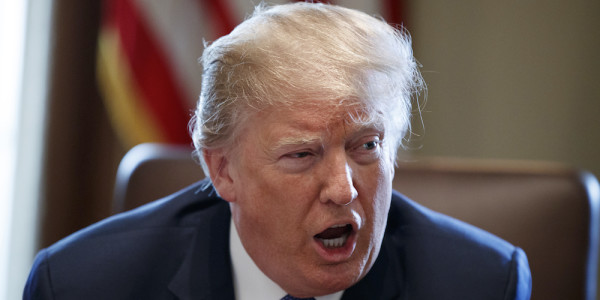

U.S., British and French military forces attacked Syria on Friday in response to an April 7 chemical attack, which President Donald Trump decried as a “significant escalation in a pattern of chemical weapons use.”
Speaking from the White House on Friday night, Trump said that the three countries’ militaries had struck “targets associated with the chemical weapons capabilities of Syrian dictator Bashar al-Assad.”
“We are prepared to sustain this response until the Syrian regime stops its use of prohibited chemical agents,” Trump said.
No further attacks are planned for now unless Assad uses chemical weapons again, Defense Secretary James Mattis said during a Pentagon news briefing.
“Right now, this is a one-time shot and I believe that it sent a very strong message to dissuade him, to deter him from doing this again,” Mattis told reporters.
As of Friday night, there were no reports of U.S. military losses. The strike involved roughly twice as many munitions used as last year, when the U.S. military launched 58 cruise missiles at a Syrian air base in response to another chemical attack.
None of the targets struck on Friday were part of an attempt to kill Assad, Mattis said. “The targets tonight, again, were specifically designed to degrade the Syrian war machine’s ability to create chemical weapons and to set that back,” he said. “There were no attempts to broaden or expand that target set.”
Naval and air forces from the United States, France and Britain took part in Friday’s strikes, said Chairman of the Joint Chiefs of Staff Marine Gen. Joseph Dunford, who declined to specify the units involved, citing operational security.
Three chemical weapons facilities were struck: A scientific research center in the greater Damascus area; a chemical weapons storage facility west of Homs, described as the “primary location of Syrian Sarin and precursor production equipment:” and a nearby storage facility and command post, Dunford said.
“Important infrastructure was destroyed, which will result in a setback for the Syrian regime,” Dunford said. “They will lose years of research and development data, specialized equipment and expensive chemical weapons precursors.”
Syria fired surface-to-air missiles in response to Friday’s strikes, said Dunford, who added he was unaware of any Russian air defenses engaging the aircraft or missiles used in the operation.
Friday’s strikes come almost exactly a year after the 2017 strikes, which destroyed 20 percent of the Syrian air force in the first direct engagement between U.S. military and the Assad regime in the course of the country’s years-long civil war.
“The purpose of our actions tonight is to establish a strong deterrent against the production, spread and use of chemical weapons,” Trump said Friday. “Establishing this deterrent is a vital national security interest of the United States.”
UK Prime Minister Theresa May concurred in a statement: “A significant body of information including intelligence indicates the Syrian Regime is responsible for this latest attack. This persistent pattern of behavior must be stopped.”
While Trump also noted that the U.S. military is not looking for “an indefinite presence” in the country — a reminder of his desire to withdraw U.S. forces following the defeat of ISIS militants there in the days prior to the April 7 chemical weapons attack — he asked Americans for “prayer for our noble warriors” now pitted against the Assad regime.
“Looking around our very troubled world, Americans have no illusions,” Trump said. “We cannot purge the world of evil or act everywhere there is tyranny. No amount of American blood or treasure can produce lasting peace and security in the Middle East. It’s a troubled place. We will try to make it better but it is a troubled place.”
WATCH NEXT:
